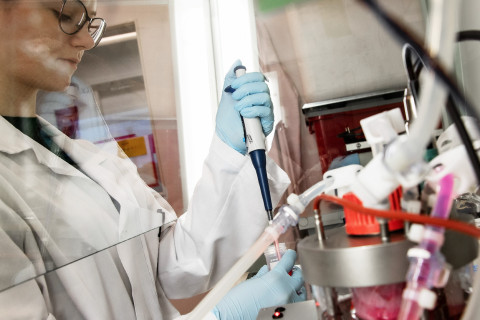Rokote Laboratories Finland Ltd., is a newly-founded, Finnish academic spin-out working to develop and introduce to the markets a nasal spray vaccine against COVID. The vaccine is based on research carried out at the University of Helsinki and the University of Eastern Finland.
The founders and board members of the company are the vaccine developers Academy Professor Seppo Ylä-Herttuala from the University of Eastern Finland, Professor Kalle Saksela and Professor Kari Alitalo from the University of Helsinki, and Mr Pasi Kemppainen, MSc (Techn.). The University of Helsinki and the University of Eastern Finland are also co-founders of, and shareholders in, the company.
The vaccine is based on gene transfer technology developed by Academy Professor Ylä-Herttuala’s research group, and the technology has already been successfully used in several clinical trials using gene therapy to treat cardiovascular diseases and cancer. The vaccine uses a safe adenovirus carrier that contains a cloned DNA strand, which causes nasopharyngeal cells to produce the virus protein which, in turn, produces a response to the vaccine. There is no actual SARS-CoV-2 virus in the vaccine. Preliminary results show that the vaccine has performed well in animal studies, and clinical testing in humans will start within a few months.
According to Mr Kemppainen, the company is now negotiating on funding to ensure further development of the vaccine and its moving towards clinical trials. After being granted a marketing authorisation, the vaccine could ensure Finnish and European security of supply, and vaccine self-sufficiency.
“The vaccine can be manufactured in considerable quantities here in Kuopio and, in the long term, it can also be licensed outside Europe. The current focus is, of course, on the COVID vaccine, but the same method can also be used to develop vaccines against other viruses,” Mr Kemppainen says.
In Kuopio, there is already the commercial technology needed to produce the vaccine.
“Mitigating the coronavirus pandemic is an extremely important objective and the new type of vaccine will certainly be useful also in the future. The development of the vaccine has moved forward rapidly, thanks to it relying on a knowledge base that has been created by years of research,” says Jukka Mönkkönen, Rector of the University of Eastern Finland.
“Diverse interaction and collaboration between universities and companies creates a foundation for new ideas, for societal impact of research, and for solving crises our society is facing,” Vice President of the University of Helsinki Paula Eerola says.
The new vaccine can induce a wider immune response and protect against new virus variants
The development of the vaccine started in spring 2020, and the universities’ research groups have been funded by the Academy of Finland.
“It is natural to continue this work in the context of a company that is able to be in charge of clinical trials in a manner required by the authorities. The universities’ ownership in the company provides excellent transparency for knowledge transfer from academic research to the company,” says Academy Professor Ylä-Herttuala, who is also chairman of Rokote Laboratories Finland Ltd.’s board of directors.
Nasal delivery was chosen as the new vaccine's method of administration because the virus is also naturally transmitted through the airways. Indeed, nasal administration seems to induce a wider immune response than intramuscular administration.
“Vaccines injected intramuscularly produce IgG antibodies in the bloodstream, but nasal vaccines also produce an IgA response that protects mucous membranes. We assume that this can also prevent those who have received the vaccine from transmitting the virus,” Academy Professor Ylä-Herttuala says.
According to him, the currently ongoing vaccination programmes do not eliminate the need for new vaccines, as new variants are expected to cause new waves of infection.
“Even if we were able to vaccinate the entire population, at least people in medical risk groups will still need new vaccines against new variants in the upcoming years. The vaccines currently in use provide a clearly lower protection against the South African variant, which will likely be the dominant virus in the next wave. Our vaccine already takes into account the most important variants, i.e. the South African, Brazilian and the UK one. There will certainly be a demand for this type of vaccine,” says Professor of Virology Kalle Saksela from the University of Helsinki.
The company will carry out the first clinical vaccine trials in Finland. Many people have already expressed an interest in participating in these trials, but the participants will be recruited digitally to obtain samples that are population-representative and comparable.
For further information, please contact:
Academy Professor Seppo Ylä-Herttuala, University of Eastern Finland, tel. +358 40 355 2075, seppo.ylaherttuala(at)uef.fi
Professor Kalle Saksela, University of Helsinki, tel. +358 294126770, kalle.saksela(at)helsinki.fi
Pasi Kemppainen, Rokote Laboratories Finland Ltd., pasi(at)rokote.com
Rector Jukka Mönkkönen, University of Eastern Finland, tel. +358 29 445 8057, jukka.monkkonen(at)uef.fi
Vice President, Professor Paula Eerola, University of Helsinki, vicepresident(at)helsinki.fi
Photo on top of page: A vaccine produced in a bioreactor goes under further processing in a sterile laminar flow cabinet. The photo is from the National Virus Vector Laboratory at the A.I. Virtanen Institute for Molecular Sciences in the University of Eastern Finland.



